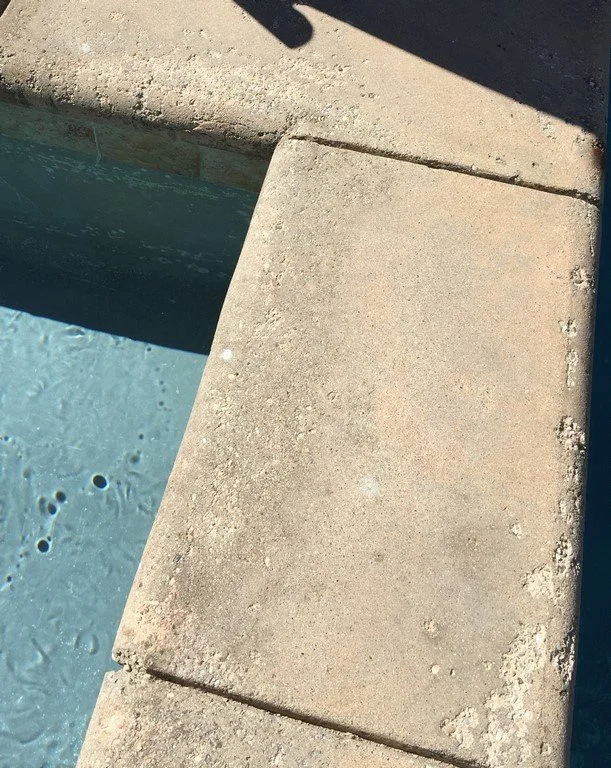Chlorine vs Salt
When it comes to keeping your pool clean, there are three main options: chlorine, saltwater, and mineral systems. So what's the difference? Which one is better for you, your pool, and your wallet? Let's take a closer look at the pros and cons of each to help you make an informed decision.
Conventional Chlorine Pool System (The Classic)
Chlorine-based sanitizers have long been a staple in pool sanitation, known for their ability to kill bacteria. Chlorine is readily available in many household cleaning products and tap water, making it a cost-effective and accessible choice. This is why chlorine remains a popular option for pool owners who value its straightforward germ-killing properties.
A traditional chlorine system operates by adding chlorine to the pool as needed, usually once a week. This can be done using chlorine tablets, granular chlorine, or liquid chlorine. Chlorine sanitizes pools through chemical reactions that break down the cells of harmful bacteria, making them harmless. This process is similar to using bleach, which is often composed of chlorine or hydrogen peroxide. While using bleach to sanitize a pool is possible, it is much more costly than using raw chlorine chemicals such as tablets or granular.
While the initial cost may be cheaper, the maintenance expenses of using a chlorine system can add up over time, especially if chlorine levels are not properly maintained and the pool turns green. Some choose to spread the cost of pool maintenance over time, making it a budget-friendly option for many.
The Advantages of a Conventional Chlorine Pool System:
A traditional chlorine system offers several benefits, including low initial investment cost and ease of adding chlorine to the pool. Despite the recent increase in the cost of chlorine, the systems themselves are still affordable and user-friendly. Regular monitoring and adding chlorine as needed will keep your pool clear. Another advantage is minimal equipment maintenance, and readily available maintenance services if needed.
The Disadvantages of a Conventional Chlorine Pool:
You remember that signature smell of a swimming pool that takes you back to your childhood pool days? That's mostly due to chloramine. It's what happens when chlorine and bacteria mix in the pool. Some people don't dig the smell, plus it can irritate their skin and eyes and be tough on their hair and clothes.
And that's not the only thing - chlorine pools have another big issue. They don't keep themselves in check, which means even though they're usually the cheapest option for a pool cleaning system, they also need the most love from you. If your pH levels go a little crazy, your chlorine won't work as well and you'll have to add more chemicals. And without a stabilizer like cyanuric acid, your chlorine levels will drop quickly in the sun.
Just a friendly reminder, chlorine can be dangerous stuff. It's totally fine in a pool when it's diluted, but in its pure form or as tablets, it needs to be stored and handled carefully.
The strong chlorine smell in a pool means levels are high.
Chlorine can be tough on your eyes and skin, causing red, irritated eyes and skin irritation. To protect yourself, wear goggles while swimming and limit exposure to chlorine fumes. Showering after swimming with a gentle soap can also help reduce the impact of chlorine.
Salt Water Pool System: (It’s Not Ocean Salty)
Saltwater pools aren't quite like the ocean - they won't have that salty taste or make you float like the Dead Sea. And despite the name, they don't actually have a high salt content. But, here's the lowdown: these pools still use the same chemicals as regular chlorine pools, just in a more efficient way. Instead of adding chlorine directly, you add salt which converts into chlorine through a special cell. So, you're basically making your own chlorine on site.
The Benefits of a Saltwater Pool:
Say goodbye to red eyes and itchy skin - saltwater pools eliminate many of the negative side effects of traditional chlorine pools. The water is also gentler on hair and clothes and feels softer. And, the best part? Maintaining the chemical levels is easier - you'll need to check less often and make fewer adjustments. Plus, the cost of salt is low and it's self-recycling! So, it's a win-win situation.
The Problem With A Salt System:
A concrete cantilever pool coping is one of the few materials that can withstand the harsh effects of saltwater on a pool environment. However, even concrete is no match for the natural biodegrading power of salt.
Saltwater pools may feel good, but their is no getting around it, that dang salt IS going to harm your pool's materials over time. Just like cars or bridges and other objects in salty environments, The salt causes corrosion and damages the metal components in your equipment and even the surrounding decking or rock work around the waterline.
When considering a saltwater pool, keep in mind that the extra costs for repairs due to corrosion can be substantial and may offset any savings from using less chlorine.
Consider the potential drawbacks and understand that all of your saltwater pools components may not have the same longevity as a traditional pool. Before making a decision, take the time to weigh the pros and cons.
Mineral Pool System (Our Preferred Setup)
If you're looking for a way to swim in a pool with less chlorine, mineral systems might be just what you need. Instead of relying solely on chlorine, this system adds a blend of minerals like magnesium chloride, sodium chloride, and potassium chloride to the water. These minerals help keep your pool looking and feeling awesome by taking care of any yucky algae, bacteria, or other junk. It's a pretty sweet solution that's been around for ages and has proven to be a great way to keep pools clean and safe for swimming.
Why We Like Mineral Systems:
By using a mineral system, you can significantly reduce your need for chlorine - up to 50% less! And if you add a UV Sanitation System to the mix, you can reduce your chlorine usage even further - how cool is that? Swimming in a pool with a mineral system also comes with added benefits. With low chlorine levels, you can say goodbye to dry skin, itchy eyes, and damaged hair that can often come with traditional chlorine systems.
Another great perk of mineral systems is that they are gentler on your pool and its components. With fewer harsh chemicals in the water, you won't have to worry about wear and tear caused by chemical reactions. Unlike saltwater systems, mineral systems won't corrode metal, clothing, or concrete either, giving you one less thing to worry about.
Or, maybe this could be you.
No, but seriously in recent years there has been a rise in popularity of mineral pools greatly due to the therapeutic benefits that comes with soaking in the water. Mineral pools have been found to help improve circulation, alleviate pain, relieve stress, as well as being gentler on the skin.
What Are The Drawbacks Of A Mineral System?
It's true that people who use mineral systems still use a small amount of chlorine. The recommended range of free chlorine in a normal chlorinated pool is between 1.0 and 3.0 parts per million (ppm), with most pools keeping the levels between 2-3 ppm. On the other hand, a mineral pool should not have more than 0.5 ppm of free chlorine. If a mineral system owner is still using a high level of chlorine, it may indicate that the mineral system is not working optimally or that there are other factors affecting the water quality. It is important to monitor the chlorine levels in your pool and make adjustments as needed to ensure that the water remains clean and safe for swimming.
Mineral pool systems are a popular choice for those looking for a natural and gentle approach to pool sanitation. They use minerals instead of harsh chemicals to keep the water clean and healthy, and are easy to maintain. Despite a higher upfront cost, they offer a cost-effective solution in the long run. If you're looking for a safe and budget-friendly way to keep your pool clean, mineral systems are a great option to consider.




